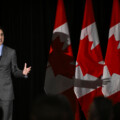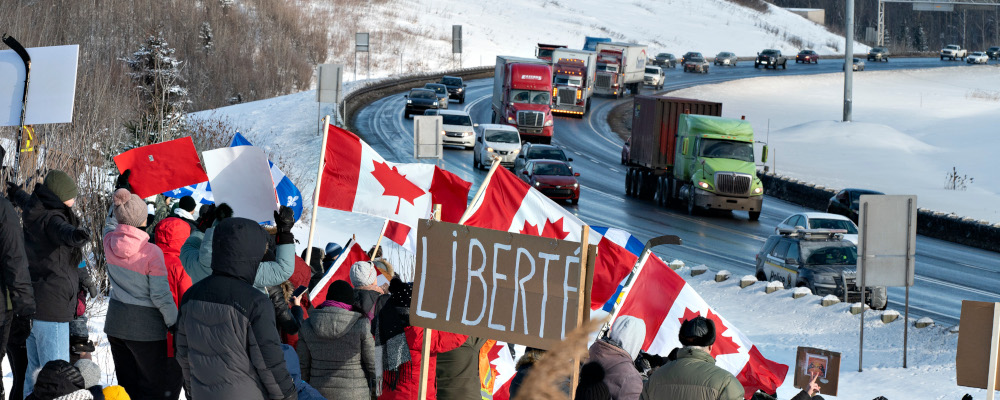My career as a political essayist began thirteen years ago when I was asked by Rabble.ca to expand on my views about the prorogation crisis and why public opinion had turned so sharply in Stephen Harper’s favour, even among supporters of the parties trying to topple his government.
My thesis, then, bears repeating today:
“In our voting system, the most successful party is one best at reducing the number of choices its potential voters feel that they have. A look at Liberal messaging shows that Jean Chretien became increasingly reliant on his ability to convince potential NDP and Green Party supporters to vote for his party. And despite his antipathy for Chretien, Paul Martin intensified this approach. What we missed during that time was how this change in Liberal tactics helped to change Canadian ideas of what made a legitimate government. As the Liberals lost their capacity to intimidate left-of-centre voters, they lost power. And Canadians learned a lesson: a government’s legitimacy comes not from its ability to appeal to the majority but instead from its ability to control and discipline its own supporters and potential supporters.”
In the ensuing thirteen years, this idea has become increasingly entrenched in mainstream Canadian values. If a candidate for office or legislator expresses any view contradicting their party’s leadership in any way, it becomes a scandal, even if their view is broadly supported by the public and the head office view is unpopular.
It is covered in the media as a threat to a party’s ability to govern because the leadership’s control over its legislators and prospective legislators is less than absolute. It reveals not that a party is diverse, complex, and pluralistic (all things once deemed core Canadian values) but rather that the party is weak and unsafe because it permits diversity, complexity, or pluralism. The country that invented the Westminster parliamentary system still routinely tolerates dozens of MPs voting against a party’s leadership and yet not just remaining in the fold but eligible for future promotion. Indeed, the Westminster system was designed to handle major splits within the factions it represents.
Caucus rebels, back in the twentieth century, were understood to be legislators who could be expected to vote against and/or publicly contradict their leaders during every term they served. Today, the definition of a caucus rebel is a legislator who votes in lockstep with their party, never makes a public pronouncement not approved of by the party but grumbles about having to do this in private with their core supporters. MPs and MLAs, right now, are being punished by chiefs of staff and party whips simply for privately grumbling—that is all that dissent has become.
As I predicted back in 2008, the people who now hold this belief that anything less than total control and absolute discipline is a sign of weakness and illegitimacy are now what pollsters politely call “the centre-left.”
Sadly, as with all broadly held cultural assumptions, these values concerning control, submission, and dissent eventually escape their original context and run rampant through society. If people become convinced of a new moral order for how the world above them should run, it ultimately shakes down to the world below.
And we see this here with centre-left reaction to the national truckers’ protest in Ottawa. No permanent organization is running this protest, which appears to be built around social media, a GoFundMe page, and a loose affiliation of local leadership groups developed in provincial protests by truckers over the past few years.
And of course, it does not represent all or even most truckers in the industry. The crew who are in Ottawa are whiter, more rural, and more right-leaning than the industry as a whole, which is, in turn, whiter, more rural, and more right-leaning than Canadian society as a whole. The folks in Ottawa are also more likely to be “owner-operators,” who have financed their heavy equipment through financial institutions. Those driving trucks owned by extended families or by trucking companies directly are much less likely to be part of the protest.
There is no doubt that a small fraction of these individuals are members of Canada’s tiny fascist militias, the Sons of Odin, the Proud Boys, and other far-right political groups and that a disproportionate number voted for the People’s Party. In addition, the spirit of the protest and the issue it is taking up, vaccine passports, have attracted members of right-wing groups that are not themselves truckers but wish to express solidarity or see the protest as an organizing and recruitment opportunity.
Those of us who cut our teeth in the 1980s peace movement know this story well. The Vancouver Peace March used to attract 10 percent of the city’s population (50,000 protesters at its peak) for its annual walk across Burrard Bridge to support global nuclear disarmament. And, consequently, the vanguard of the march comprised the Trotskyites, Maoists, and other communist sectarians and foreign dictator fan clubs who saw this as their big annual opportunity to radicalize and recruit ordinary anti-nuclear activists.
Right-wing commentators sought to discredit these protests by heavily featuring and platforming the most off-topic or the most radical protesters and then seeking to paint all protesters with that broad brush. This approach generally failed and was mocked by the mainstream press, who depicted the diversity of protesters and homemade signs as a sign of the depth of its support.
But today, that approach is working because our society’s mainstream values have changed and because the target audience is a different one.
Because Canadians, as a whole, but especially centre-left voters have now come to believe that the legitimacy of a movement inheres not in its size or the diversity of people and views it represents but rather in its ability to discipline and control its supporters, this protest looks both illegitimate and frightening. Not only is this protest not controlling the speech and signage of its members; it is celebrating its refusal to control these things and instead sticking to the basics of making sure protesters are nonviolent and law-abiding.
And, in progressive, urban Canada, this broad-brush guilt-by-association strategy exhumed from the 1980s appears to be working, no matter how intellectually lazy its journalistic practitioners are being. Let me rehearse the kinds of sloppy reporting we are seeing here:
- The most bigoted and ignorant Tweets and Facebook comments by individuals supporting the truckers are being cherrypicked and reported as news about the protesters’ shared beliefs, usually without even checking to see if the person is even in Ottawa as part of the protest. The views are not those of the organizers, just its most offensive and deranged supporters. This move, akin to writing a peace march article primarily covering the views of pro-North Korea and nudist activists at the walk, is going over shockingly well with Canada’s urban centre-left because it signifies to them one or both of two things (a) the truckers are all homophobic Klansmen or (b) the organizers are unable/unwilling to control the speech and signage of every participant in the protests.
- Mainstream politicians like Timmins-James Bay MP Charlie Angus are able to credit any hate mail or abusive communication to “the convoy crew” and have the protesters and organizers collectively blamed for the communication. Again, this rhetoric is only effective because we have made the belief that the organizers of a protest can or should control the private correspondence of every single participant and supporter a reasonable one.
- Despite a recent passing interest in toppling pro-Confederate and pro-war statues in the United States, Canadian progressives have suddenly become very concerned about nationalist statuary. While I would never try to politicize a Terry Fox statue, myself, the level of offense centre-left urbanites are taking at people placing entirely removable and undamaging objects and signs on Ottawa’s Fox memorial is deeply worrying. No one has toppled the statue; nobody has even got paint on it. Similarly, the fact that there is urine of unknown provenance in the snow near the memorial to the unknown soldier is now being redescribed as protesters, as a whole, urinating on and thereby desecrating the war memorial. Who knew that the mere possibility of a half a dozen or fewer individuals disrespecting a war memorial by urinating near it could de-legitimate a gathering of thousands in the minds of Canada’s mainstream centre-left!?
- Many protesters are making false and unreasonable comparisons between present-day Canada and the early days of Nazi Germany. Like most Canadians, I find these comparisons deeply offensive. But that is what they are: deeply offensive comparisons, born largely of ignorance and a persecution complex. The prevalence of such comparisons among the truckers would, in my view, be a reasonable issue for news media to cover. But, instead, what we see is rhetorical overreach into falsehood. News media are depicting the hand-drawn swastikas and upside-down maple leaves used in the posters making those comparisons as endorsements of Naziism and opposition to the existence of Canada. While I am sure there are some genuine Nazi sympathizers among the thousands of truckers in Ottawa, the protest art I have seen using the swastika is the basis of an inaccurate and offensive comparison and not an endorsement of Hitler. Fortunately, because Canadians’ willful embrace of ignorance and stupidity, urban progressives who can, themselves, barely hold onto the idea that one can compare one thing to another thing, are unable to imagine that the truckers may be using symbols to make a comparison—no, they must all be Nazis, traitors.
While it is true that I agree with the truckers on the main issue they are raising, that of vaccine passports, they are not my political community. I agree with them on few if any other issues. Many do hold views I find not just disagreeable but repugnant. I am sure many are climate denialists, for instance.
I am not writing this piece to advocate for the protest and its participants. I am writing this piece to ask Canadians like me whether we want our future protests to be judged and covered by standards applied to the truckers today. I am asking us to think about what happens to the horizon of possibility for mass organizing when we throw in with the idea that actual, authentic grassroots protests are a thing of the past and the only legitimate public demonstration is one choreographed from above, its participants carefully disciplined into reading from an identical script or into silence.
We should also think about the Proud Boys and Sons of Odin who have gone to the rally to radicalize its participants. The on-the-ground experience of regular folks participating will be of being called Nazis, traitors, Klansmen, bigots, etc. Not only will this place greater distance between the participants and urban Canadian society; it will make them look less unfavourably on others who are called Nazis and Klansmen. How bad could those guys really be, they will ask themselves? Were they also smeared as part of a bum rap by shills for the pharmaceutical industry?
They will wonder if those folks also came to be known as these things the way they did. As a person who, because I dissented from the progressive consensus on a single issue, has been smeared as a transphobe, homophobe, pedophile, white supremacist, racist, and ableist in the past year and a half, I can no longer simply accept the opinion of centre-left media on whether someone is a dangerous, bigoted member of the alt-right. I can no longer trust the government-financed Canadian Anti-Hate Network on whether someone is a dangerous hatemonger because many of my comrades and I are on their list. And not everyone is going to be like me and check those claims against the facts. Most people will just start ignoring those claims.
There is a high price to pay when you decide to cry “wolf” over fascism in a political situation like our own, where the authoritarian threat is real and society-wide.
More importantly still, I am trying to sound a cultural alarm bell about the exaltation of order, disciple, and control as Canadians’ primary political values. The fact is that those values are authoritarian. In a nation wherein rapid, dramatic change is not just a moral necessity but an ecological one, we need to retain the capacity for mass mobilization and our capacity to resist an authoritarian regime, irrespective of whether it calls itself progressive or conservative.
Recommended for You

The Notebook by Theo Argitis: Carney’s One Big Beautiful Tax Cut, and fresh budget lessons from the U.K.

Ginny Roth: How vacant liberal nationalism left Canada worse off than George Grant even imagined

Peter Menzies: Justin Trudeau’s legislative legacy is still haunting the Liberals

‘There are consequences to this legislation’: Michael Geist on why the Canada-U.S. digital services tax dustup was a long time coming



